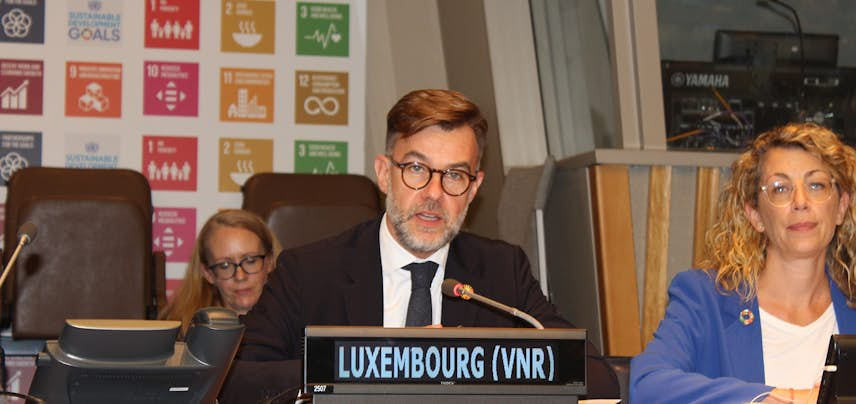Coherence of development policies
The Luxembourg Development Cooperation is actively committed to promoting and supporting the coherence of policies for development in the context of the implementation of Agenda 2030. This enables it to contribute to the coherence of all Luxembourg’s actions in developing countries and to evaluate its effective contribution to sustainable development.
In terms of external policies in a development cooperation context, Luxembourg has developed several tools to ensure it adopts a coherent policy in support of the sustainable development goals (SDGs). The 3D approach (diplomacy, development and defence) implemented in the context of Luxembourg’s foreign policy, as well the whole-of-government approach introduced with the coalition agreement, constitute the main reference framework for ensuring coherence between national and foreign policies, with the primary aim of contributing to sustainable growth and stability. The “Development – Climate – Energy” Indicative Cooperation Programme (DCE ICP, 2021 – 2025) between Cabo Verde and Luxembourg marks the first opportunity for the implementation of a whole-of-government approach by the Luxembourg Development Cooperation, aiming to strengthen the impact of public investment in sustainable development, integrating all stakeholders and sources of Luxembourg financing likely to contribute to it.
In 2018, the Luxembourg Development Cooperation adopted a general development cooperation strategy entitled “Road to 2030” , which is inspired by the SDGs and aims to help eradicate extreme poverty and promote economic, social and environmental sustainability. Since 2021, three thematic strategies have been added to it to promote the more systematic integration of cross-cutting priorities relating to gender equality, environmental sustainability and financial inclusion, which will serve as a compass for interventions by the Luxembourg Development Cooperation. Human rights are a cross-cutting priority in the “Road to 2030” strategy.
The SDGs reiterate the commitment to improve policy coherence for development in terms of goals, sectors and actors, thereby encouraging a favourable environment for sustainable development. This involves assessing whether and to what extent national policies effectively contribute to the attainment of the aims set in Agenda 2030 in developing countries. In this sense, The Luxembourg Development Cooperation supports the inclusion of impact on developing countries within the Nohalteg- keetscheck, which will make it possible to test the sustainability of legislative initiatives, thus boosting the synergies between national policies and international cooperation.
Nationally, the Interministerial Committee for Development Cooperation (ICDC) is responsible for pan-governmental coordination on development cooperation and coherence of development policies.
Internationally, as part of its monitoring and review mechanisms, the United Nations “2030 Agenda for Sustainable Development” encourages Member States to conduct regular and inclusive reviews of progress at national and sub-national levels ( “Voluntary National Review/VNR” ). These national reviews serve as the basis for regular reviews by the High-Level Political Forum on Sustainable Development (HLPF), convened under the auspices of the United Nations Economic and Social Council (ECOSOC). Luxembourg carried out an initial Voluntary National Review in 2017 and a second in 2022. The results of Luxembourg’s 2022 VNR were presented jointly by Ministers Fayot and Welfring in New York on 15 July 2022 at the High-Level Political Forum on Sustainable Development, with Minister Fayot speaking about the Grand Duchy’s efforts and initiatives to advance the attainment of the SDGs in developing countries. In September 2022 there was an exchange between the ministers and the Joint Parliamentary Committee on Foreign and European Affairs, Cooperation, Immigration and Asylum and the Committee on the Environment, Climate, Energy and Spatial Planning on the results of the VNR.
In order to strengthen policy coherence, Luxembourg is supported by the Organisation for Economic Co-operation and Development (OECD), which makes recommendations for the adjustment of Luxembourg’s mechanisms to make them even more effective and efficient. For example, Luxembourg has launched, under the aegis of the Ministry of the Environment, Climate and Sustainable Development and the Directorate for Development Cooperation and Humanitarian Affairs, an institutional analysis process on policy coherence for sustainable development, together with the OECD. The aim is to strengthen existing mechanisms and institutional capacities for policy coherence in order to achieve sustainable development objectives, both nationally and internationally. Thus, two workshops were held in the format of a joint meeting between the ICDC and the ICSD, in April and July 2022.
All development cooperation actions feature a multi-stakeholder approach in order to increase their effectiveness. This approach fosters dynamic and diverse partnerships with international, national and local NGOs and also seeks to promote increased collaboration with private sector and research actors (including through public-private partnerships that can mobilise additional resources), in particular within its partner countries. The state of progress regarding development policy coherence is also closely monitored by the NGOs’ Cercle de Coopération, which, with the support of the Luxembourg Development Cooperation, regularly makes observations and implements awareness-raising activities, particularly in the areas of fair trade and socially responsible clothing.
